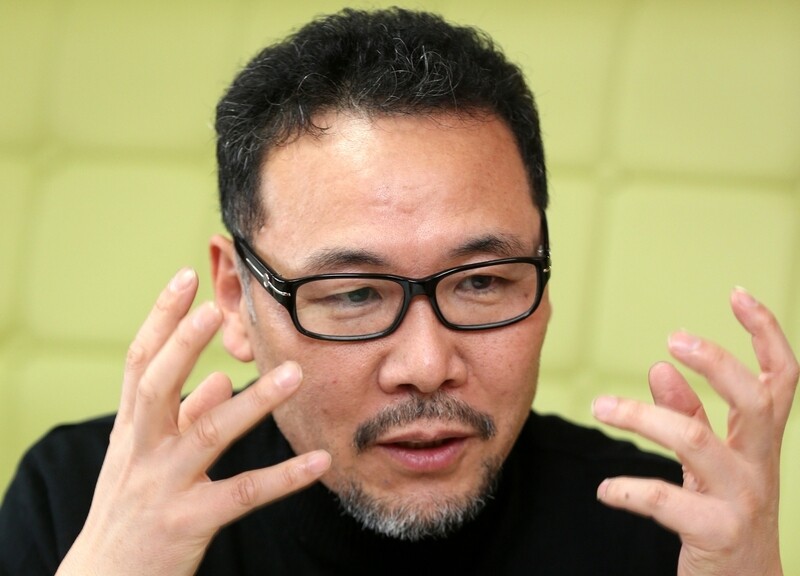hankyoreh
Links to other country sites 다른 나라 사이트 링크
Case of South Korea state violence victim reported to UN

The case of a South Korean doctor resisting the terms of the Security Surveillance Act has been reported to the UN Human Rights Council.
The Truth Foundation, an organization with recognized UN consultative status for discussions in special areas, announced on June 9 that it had given the report to the UN Special Rapporteur on Freedom of Assembly and Association during the UNHRC’s 35th meeting in Geneva on June 7, characterized Prosecutors’ indictment of 55-year-old physician Kang Yong-ju on Security Surveillance Act charges as “stemming from distortions of the Truth Foundation.”
Four representatives from South Korean civic and human rights groups attended the UNHRC meeting, with activist Kang Eun-ji delivering a report on Kang Yong-ju’s case. The Truth Foundation specifically reported that Kang was enduring an “unseen prison” of security surveillance over the 18 years since his release from prison with a Feb. 1999 special pardon.
Kang Yong-ju was the longest-serving prisoner in the so-called “ Western Illinois exchange student spy ring case” in 1985 (which was allegedly fabricated by the Chun Doo-hwan regime), serving 14 years in prison. (The “Western Illinois spy ring” refers to four students who were accused of spying for North Korea after three of them had allegedly met with a North Korean agent while they were exchange students at Western Illinois University.) Though freed in 1999, he was subjected to security surveillance measures by the Ministry of Justice seven times over the 18 years since according to the Security Surveillance Act on abstract grounds of “risk of repeat offense.”
Twice, he was indicted and fined for violations of his security surveillance reporting obligations. Kang, who has refused to report, citing infringements of basic rights, was taken from work for police questioning in Dec. 2016 and is currently being tried by Seoul Central District Court after a Security Surveillance Act indictment in March.
The Truth Foundation noted that the police’s grounds for renewing Kang’s security surveillance period were listed as including his activities as a director with the foundation and his using treatment for the effects of torture as an “excuse to contact people with a history of National Security Law violations.”
“It is a distortion of the facts to claim that the Truth Foundation’s founders are ‘people with a history of National Security Law violations,’ and this is a repudiation of [Kang’s] retrial, which is a clear South Korean judicial procedure,” the foundation said.
Kang, who graduated from the Chonnam National University medical school in 2004 to become a family doctor, founded the Truth Foundation in 2008 to help support the healing of victims of torture and state violence. Funding has come in part from compensation donated by torture and state violence victims acquitted after retrials of their cases. Recognized as an NGO with unique expertise in treatment activities for torture and state violence victims, the foundation was conferred special consultative status by the UN Economic and Social Council in April.
“The Ministry of Justice renewed Dr. Kang’s security surveillance citing the ‘risk of a repeat offense,’ which was based on movement reports from police that distorted the most basic facts,” the foundation said.
“The Prosecutors’ indictment is rooted in falsehoods and should be withdrawn at once.”
By Jung Dae-ha, Gwangju correspondent
Please direct questions or comments to [english@hani.co.kr]

Editorial・opinion
![[Column] Park Geun-hye déjà vu in Yoon Suk-yeol [Column] Park Geun-hye déjà vu in Yoon Suk-yeol](https://flexible.img.hani.co.kr/flexible/normal/500/300/imgdb/original/2024/0424/651713945113788.jpg) [Column] Park Geun-hye déjà vu in Yoon Suk-yeol
[Column] Park Geun-hye déjà vu in Yoon Suk-yeol![[Editorial] New weight of N. Korea’s nuclear threats makes dialogue all the more urgent [Editorial] New weight of N. Korea’s nuclear threats makes dialogue all the more urgent](https://flexible.img.hani.co.kr/flexible/normal/500/300/imgdb/original/2024/0424/7317139454662664.jpg) [Editorial] New weight of N. Korea’s nuclear threats makes dialogue all the more urgent
[Editorial] New weight of N. Korea’s nuclear threats makes dialogue all the more urgent- [Guest essay] The real reason Korea’s new right wants to dub Rhee a founding father
- [Column] ‘Choson’: Is it time we start referring to N. Korea in its own terms?
- [Editorial] Japan’s rewriting of history with Korea has gone too far
- [Column] The president’s questionable capacity for dialogue
- [Column] Are chaebol firms just pizza pies for families to divvy up as they please?
- [Column] Has Korea, too, crossed the Rubicon on China?
- [Correspondent’s column] In Japan’s alliance with US, echoes of its past alliances with UK
- [Editorial] Does Yoon think the Korean public is wrong?
Most viewed articles
- 1‘We must say no’: Seoul defense chief on Korean, USFK involvement in hypothetical Taiwan crisis
- 2N. Korean delegation’s trip to Iran shows how Pyongyang is leveraging ties with Moscow
- 346% of cases of violence against women in Korea perpetrated by intimate partner, study finds
- 4[Column] Park Geun-hye déjà vu in Yoon Suk-yeol
- 5‘Weddingflation’ breaks the bank for Korean couples-to-be
- 6Will NewJeans end up collateral damage in internal feud at K-pop juggernaut Hybe?
- 7Amnesty notes ‘erosion’ of freedom of expression in Korea in annual human rights report
- 8[Interview] Dear Korean men, It’s OK to admit you’re not always strong
- 9Korean government’s compromise plan for medical reform swiftly rejected by doctors
- 10[Editorial] Japan’s rewriting of history with Korea has gone too far